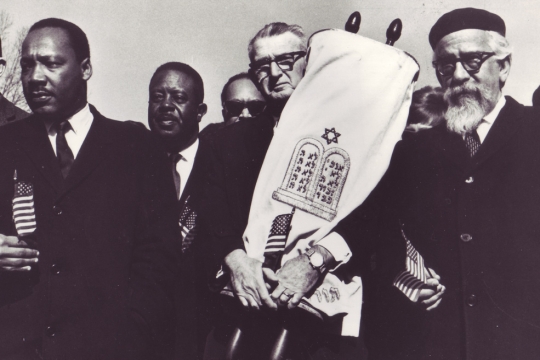[ Excerpted from A. Vorspan and D. Saperstein, Jewish Dimensions of Social Justice: Tough Moral Choices of Our Time (UAHC Press: 1998, 203ff) ]
It is unsurprising that Jews responded powerfully to the fight against racial segregation and discrimination in America. After all, no group in history has been so frequently the victim of racial hatred. As a result, few segments of the American community have invested themselves as deeply as the Jewish community in the struggle for civil rights. As a result of the demands of faith and of enlightened self-interest, Jews served in the forefront of the fight to end racial segregation in education, public accommodations and voting, by playing an active role in the equality struggles of the ’50s and ’60s, when a strong black/Jewish alliance was at the heart of the civil rights movement.
- When the Mississippi Summer of 1964 was organized to break the back of legal segregation in the most stubbornly resistant state of the Union, 50 percent of the young people who volunteered from all parts of the United States were Jews. In that struggle, white extremists killed three martyrs in Philadelphia, Mississippi. Two of them, Andrew Goodman and Michael Schwerner, were Jewish; the third, James Earl Chaney, was black.
- Jews helped found and/or contributed substantially to the funds raised by such organizations as the National Association for the Advancement of Colored People, the Southern Christian Leadership Conference and the Student Non-Violent Coordinating Committee.
- For many years, Kivie Kaplan (a vice-chair of the Reform Jewish movement) was the national president of the NAACP; Arnie Aronson and Joe Rauh Jr. served as secretary and general counsel, respectively, to the Leadership Conference on Civil Rights (LCCR); Jack Greenberg was the executive director of the NAACP Legal Defense Fund. These were just a few of the many Jews who played key roles in the civil rights movement. Fittingly, in 1998, President Clinton presented the Presidential Medal of Freedom to Aronson, an American Jewish leader who, with the legendary A. Philip Randolph and Roy Wilkins, founded the LCCR. For decades, Aronson led Jewish and black civil rights leaders in mapping strategies to pass more than 30 far-reaching civil rights laws.
- From 1910-1940, more than 2,000 schools and 20 black colleges (including Howard, Dillard and Fisk Universities) were funded in whole or in part by contributions from Jewish philanthropist Julius Rosenwald. At the height of the so-called “Rosenwald schools,” nearly 40 percent of southern Blacks were educated at one of these institutions.
- Rabbis marched with Martin Luther King Jr., throughout the South, where some were beaten and many were jailed. Prominent among these was Rabbi Abraham Joshua Heschel, who was a spiritual partner to King in the struggle against racism. Many of the leaders of the URJ and CCAR were arrested with Martin Luther King, Jr., in St. Augustine, Florida in 1964 after a challenge to racial segregation in public accommodations.
The Reform Movement and Civil Rights
Jewish political leverage contributed to passage of landmark civil rights laws, nationally and locally. Once civil rights and religious groups mobilized the conscience of America against racial evil, changes came at least. The Civil Rights Act of 1964 and the Voting Rights Act of 1965 were both drafted in the conference room of the RAC's building in Washington, D.C., under the aegis of the Leadership Conference on Civil Rights (which for decades was housed in the Center).
The Jewish Community continued as avid supporters of over a score of the most far-reaching civil rights laws in the nation's history, addressing persistent discrimination in voting, housing, and employment, against women, racial minorities, and persons with disabilities.
The Reform Movement has been looked to since the 1990s, as its leaders represent the Jewish community on the executive committees of LCCR and the national board of the NAACP. Rabbi David Saperstein is currently the only non-African-American on the NAACP board.
Civil Rights and the Arthur and Sara Jo Kobacker Building
For 30 years, the Religious Action Center housed a number of key civil rights and Jewish organizations who met regularly to mobilize support for civil rights legislation. The following are a sampling of some of the key civil rights bills that were either drafted at the Center and/or for which the coalition supporting the legislation held their meetings in the Center's conference room:
- Civil Rights Act of 1964
- Voting Rights Act 1965
- Americans with Disabilities Act 1982
- Voting Rights Extension
- Japanese American Redress Act
- Civil Rights Restoration Act
- Fair Housing Act Amendments of 1988
- Civil Rights Act 1991

